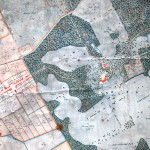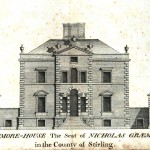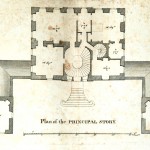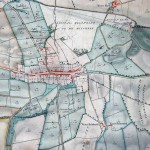This huge, printed plan was commissioned by the Cunningham Graham family of Gartmore and shows the extent of their estate in the mid 19th century. Before the Ordnance Survey undertook a comprehensive survey of the whole of Britain from the 1840s onwards, estate plans are the only source available for large scale maps of rural areas. Dating from before the Ordnance Survey reached this part of the country, this plan provides an invaluable topographical insight into the countryside at that time. There are over 52 farms shown on the plan along with the villages of Gartmore and Buchlyvie. It is from a very detailed survey and gives a clear indication of the size and shape of all the buildings plus the various types of land use from arable and pasture through to woods and bog. The names of all of those holding property adjacent to the estate are given so it provides a snapshot of the whole area at this time. As it was a working document, the plan is annotated in various places giving further information about the various properties.
The Graham family owned property in the Gartmore area from the 17th century having bought the land from the first Earl of Stirling. William Adam prepared plans for a house at the request of Nicol Graham in the 1740s and Gartmore House was built from these. It was later enlarged by Nicol’s second son, Robert Graham of Gartmore in 1779 – 80. A plan and elevation of the original house dating from this time is held at the Council Archives. Robert Graham, 1735 – 1797, was famous as a politician and poet. He is largely remembered for the famous poem ‘If doughty deeds my lady please’ and was given the nickname ‘Doughty Deeds’ after its publication.
‘If doughty deeds my lady please… ‘
Robert Cunningham Graham
If doughty deeds my lady please
Right soon I’ll mount my steed:
And strong his arm, and fast his seat
That bears frae me the meed.
I’ll wear thy colours in my cap,
Thy picture at my heart;
And he that bends not to thine eye
Shall rue it to his smart!
Then tell me how to woo thee, Love;
Oh tell me how to woo thee!
For thy dear sake, nae care I’ll take,
Tho’ ne’er another trow me.
If gay attire delight thine eye
I’ll dight me in array;
I’ll tend they chamber door all night,
And squire thee all the day.
If sweetest sounds can win thine ear,
These sounds I’ll strive to catch;
Thy voice I’ll steal to woo thysell,
That voice that nane can match.
But if fond love thy heart can gain,
I never broke a vow;
Nae maiden lays her skaith to me,
I never loved but you,
For you along I ride the ring,
For you I wear the blue,
For you alone I strive to sing –
Oh tell me how to woo!
Then tell me how to woo thee, Love;
Oh tell me how to woo thee!
For thy dear sake, nae care I’ll take,
Tho’ ne’er another trow me.
Robert Graham changed his name twice. In 1770, he took the name Bontine in order to fulfil the terms of the inheritance of the Ardoch Estate. Then in 1796, on the death of Major general John Cunningham, he took the name and arms of the Cunninghams when he inherited the Finlayson Estate. He was elected a Member of Parliament for Stirlingshire in 1794 and tried, unsuccessfully, to have a Bill of Rights passed during his time as an MP.
The last Cunningham Graham to live at Gartmore House was the famous ‘Don Roberto’ Robert Bontine Cunningham Graham (1852 – 1936). Robert was born in Renfrewshire and spent much of his childhood at the Finlaystone Estate. He travelled to Argentina where he became a successful cattle rancher and earned the affectionate soubriquet Don Roberto. Later life saw him enter politics, first as a Liberal candidate in 1886. He then went on to found the Labour Party with Keir Hardy in 1888 standing as a Scottish Labour Party MP at the election in 1892. A lifelong supporter of independence for Scotland, Robert was instrumental in the formation of the Scottish National Party and was elected their first President in 1934. Robert took over the Gartmore Estate on the death of his father in 1883 but was forced to sell it in 1900 in order to pay death duties.



